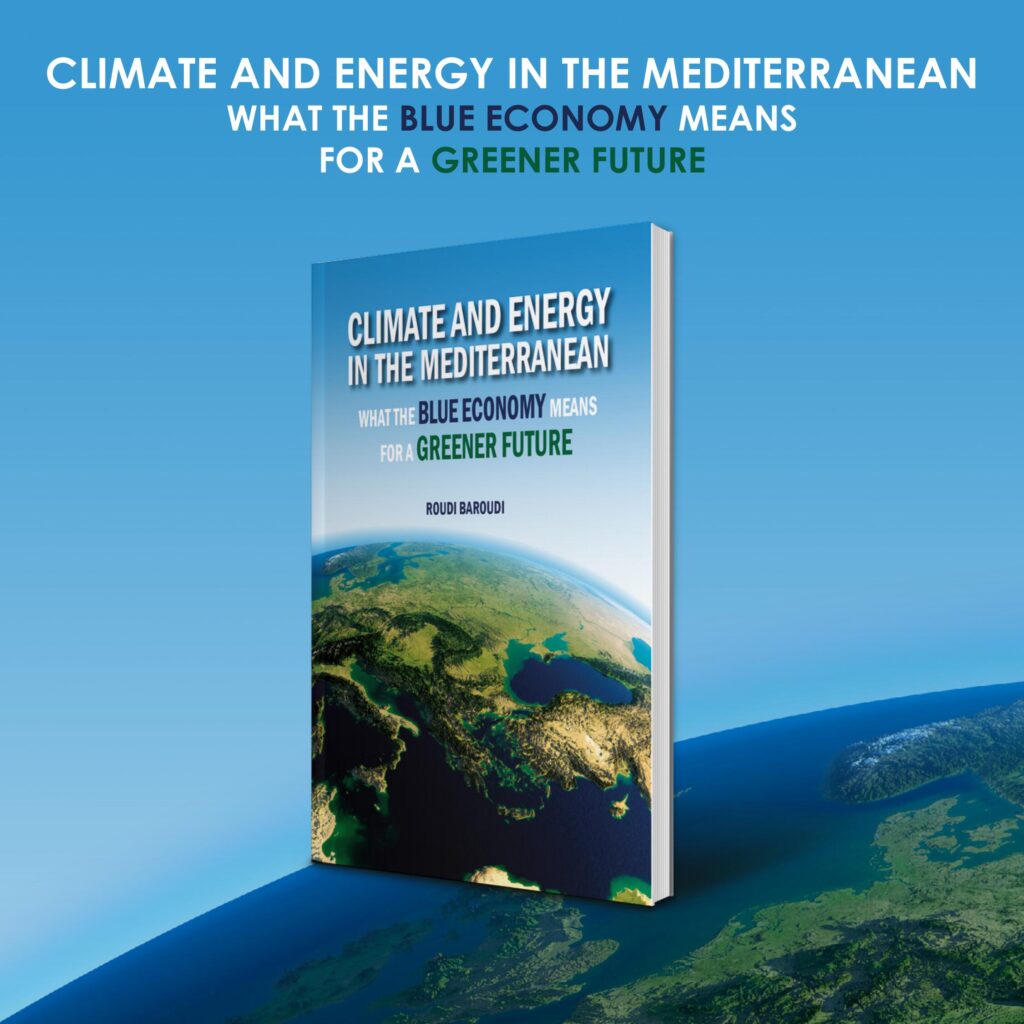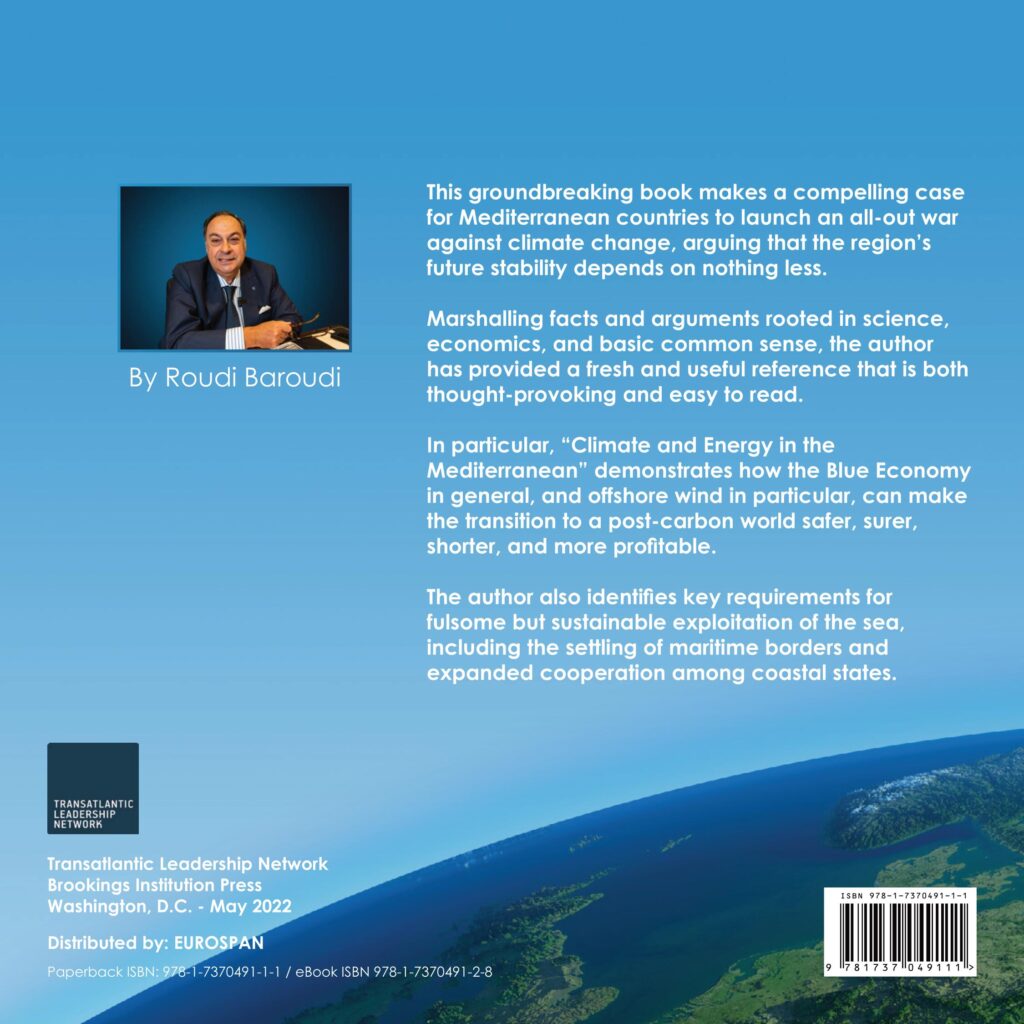New Book Says Mediterranean Could Match World’s Nuclear Output With Offshore Wind
ATHENS: Offshore wind farms in the coastal waters of the Mediterranean could generate as much electricity as the entire global nuclear industry, a regional energy expert says in his latest book.
Roudi Baroudi, CEO of Doha-based independent consultancy Energy & Environment Holding, also argues that if Euro-Med countries make the right choices, renewable energy and other “Blue Economy” activities related to the sea could form the basis for a regional economic renaissance.
Published by the Transatlantic Leadership Network, a Washington, D.C.-based think-tank, in cooperation with the Brookings Institution Press, “Climate and Energy in the Mediterranean: What the Blue Economy Means for a Greener Future” urges policymakers to seize a historic opportunity made possible by rapid technological advance. Available in both print and e-versions, it is being distributed by Eurospan of the United Kingdom.
In the book, Baroudi makes the case for Mediterranean governments to treat the sea like an inter-generational treasure, mainly by leveraging new technologies to manage and exploit its resources safely and sustainably for maximum long-term benefit. The volume contains an exclusive study by Fugro, the world’s leading provider of geo-intelligence, which puts the Med’s offshore wind energy potential at approximately 500 million megawatts – or virtually the same as all of the planet’s 440 nuclear reactors.
Baroudi, who has worked in the energy business for four decades, says that while climate change, air pollution, and the need to reduce carbon emissions are themselves powerful reasons to invest in green energy, the advantages would go far beyond environmental ones.
“All of the wind estimates I’ve used are based on existing technologies already in use today,” he said on the sidelines of the Athens Energy Dialogues, where the book is receiving a soft launch ahead of its official introduction later this year in Washington. “Countries that embrace wind will not only get a head-start on the transition from fossil fuels, but also gain huge economic, social, and other advantages. Increased energy autonomy will save them billions on imports of oil and gas, increase their energy security, and make their economies more competitive. Cleaner air will prevent sickness and disease, stronger growth and development will provide more and better jobs for their populations, reduce poverty and inequality, and in many cases, energy exports will make more revenues available for historic investments in education, transport, and other infrastructure.”
Baroudi’s qualifications to make such predictions stem from a long career of public- and private-sector work in numerous related fields, including oil and gas, power, energy reform and privatization, environmental protection, and carbon-trading mechanisms. Apart from having advised major energy companies and national governments on policy and planning issues, his experience also includes extensive project and program work for the World Bank, the International Monetary Fund, the European Commission, the US Agency for International Development, and the Arab Fund for Social and Economic Development.
Apart from renewable energy, the book also shows how increasingly sophisticated technologies could impact other industries as well, allowing people and organizations to derive more benefit from the sea while doing less damage to delicate ecosystems. Baroudi said he tried to write in simple, non-technical language to make his message accessible to a broader audience.
“I feel very strongly about making the most of our opportunities as a region,” Baroudi said, “but also about preserving nature’s bounty for future generations. I wanted the book to help make as people as possible understand the decisions before us and do whatever they can – as policymakers, investors, small-business owners, engineers, citizens, etc. – to ensure that leaders and other decision-makers make the right choices.”
“What I’m suggesting is that we can and should use all the means at our disposal, not just to clean up energy production with offshore wind, solar, wave, tidal, and undersea geothermal, but also to reinvent other pillars of the regional economy, from aquaculture and conventional fisheries to tourism and marine transport,” he added. “Modern equipment and innovative applications can also expand our Blue Economy into exciting areas like bioprospecting for new medicines, or safe and responsible deep-sea mining for vital materials used in mobile phones and the cutting-edge batteries that will help us get away from fossil fuels.”
The Athens Energy Dialogues, an annual event that attracts government officials, senior executives, academics, and other energy professionals runs from 26-27 May and features both in-person and remote appearances by key figures in the global energy industry. Baroudi’s presentation, titled “Green Energy: An Euro-Mediterranean Perspective” is scheduled for 11am Athens time (GMT+2) on the 27th.









